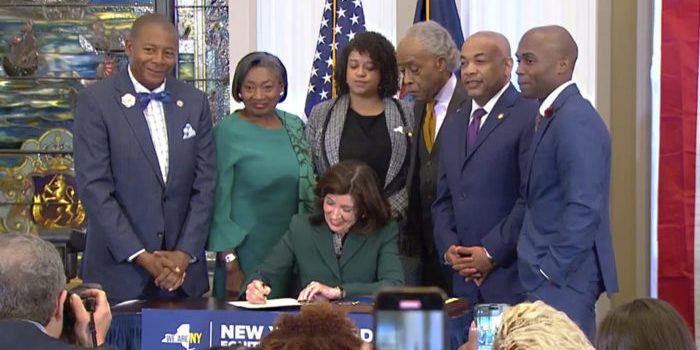(Headline USA) New York state will create a commission tasked with considering reparations under a bill signed into law by Gov. Kathy Hochul on Tuesday.
It comes at a time when the state continues to reckon with a significant financial crisis brought about largely by the Biden administration’s open-border policies, which have led to a flood of illegal immigrants in New York City and the surrounding regions.
The New York City Council passed a measure in September that likewise set up a reparations task force, following in the footsteps of similar task forces established in California and Illinois.
San Francisco, one of the first municipalities to advance the reparations agenda, recently announced that it was gutting the budget of its newly established Office of Reparations due to a severe financial deficit.
Ironically, slavery was never legal in California, which joined the nation as a free state in 1850 with a constitution that specifically outlawed it.
The legislation establishing the New York commission notes that the first enslaved Africans arrived at the southern tip of Manhattan Island, then a Dutch settlement, around the 1620s and helped build the infrastructure of New York City—“including the wall that gives Wall Street its name.”
The practice was legal in the state until it was ended in 1827 by Republican abolitionists.
That, however, did not stop Hochul, a Democrat, from shamelessly virtue-signaling over the new law, designed to pander to minority voters with “free” government money that will drive up deficits and inflation for all.
“In New York, we like to think we’re on the right side of this,” Hochul claimed at the bill signing ceremony.
“Slavery was a product of the South, the Confederacy,” she added. “What is hard to embrace is the fact that our state also flourished from that slavery. It’s not a beautiful story, but indeed it is the truth.”
The law, which was passed by state lawmakers in June, says the commission will examine the institution of slavery and its ongoing impact on black New Yorkers today.
“The battle for civil rights was not below the Mason–Dixon line,” said black activist Al Sharpton, who spoke at the signing ceremony.
“The largest port of slave trade was in Charleston, South Carolina, and Wall Street, New York,” he continued. “So this, today, starts a process of taking the veil off of northern inequality and saying we must repair the damage and it can be an example for this nation.”
The nine-member commission will be required to deliver a report a year after its first meeting.
Its recommendations could potentially include monetary compensation but would be non-binding. The panel’s findings are intended to spur policy changes, programs and projects that attempt to remedy slavery’s harmful effects.
The idea of using public money to compensate the descendants of enslaved people is almost certain to draw a backlash from some, including some white people who don’t believe they should have to pay for the sins of long-ago ancestors, and other ethnic groups that weren’t involved in the slave trade.
Questions also have been raised elsewhere about who would qualify for any reparations that were administered, since there was rarely any documentation preserved by the slaves themselves about their status and the financial losses they may have incurred from it.
Although the places where the reparations debate has flourished have all been deep-blue states and cities where the idea is more popular in principle than in practice, Sharpton said he expected Hochul to pay a political price for convening the commission.
“I want to give credit to this governor for having the audacity and courage to do what others wouldn’t do. And I know she had to wrestle with it. And I know her political advisors told her it’s too risky,” the famed civil rights activist said. “But she did it because it’s right.”
The commission set up by Gov. Gavin Newsom has become something of a looming liability after it offered up a set of outlandish proposals that had no chance of being enacted, including a repeal of the state’s racial-discrimination ban.
Newsom subsequently refused to endorse the plan, potentially costing him the support of some radical black estremists should he run for higher office, as many suspect he will.
In New York, Hochul and the legislative leaders of the state Assembly and Senate—both of which have heavy Democratic majorities—will each appoint three members to the commission. They have 90 days to make their picks.
“This is not just about who we’re going to write a check to, and what the amount is,” said Democratic Assembly Speaker Carl Heastie, who is black. “It begins the conversation with one recognizing the issues that affected black people and descendants of slaves in this state.”
State Senate Republican Leader Rob Ortt said in a statement that he believes New York’s recommendations will come at an “astronomical cost” to all New Yorkers.
“The reparations of slavery were paid with the blood and lives of hundreds of thousands of Americans who fought to end slavery during the Civil War,” he said. He added that it’s unrealistic for states to meet the potentially expensive price tag that could come with cash reparations.
New York City Mayor Eric Adams on Tuesday expressed support for the measure, noting that some venerable institutions in New York, as elsewhere, are tied to wealth that derived from exploiting the labor of enslaved people.
“We have to reckon with that,” Adams, who is black, said during a City Hall news conference.
Adapted from reporting by the Associated Press

